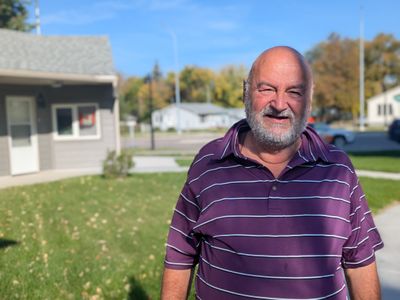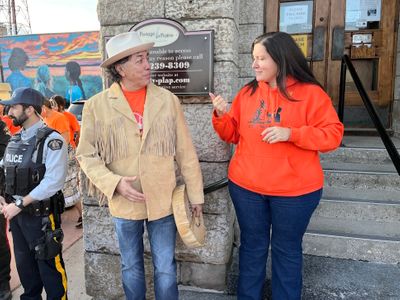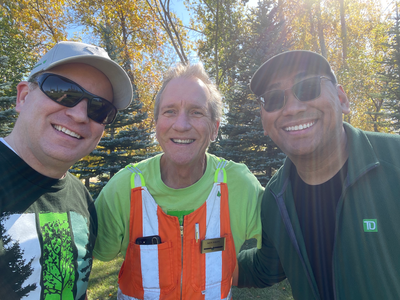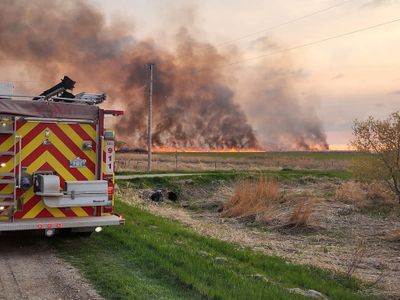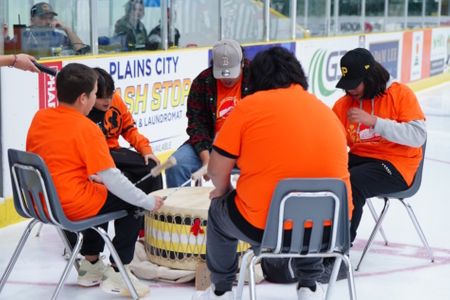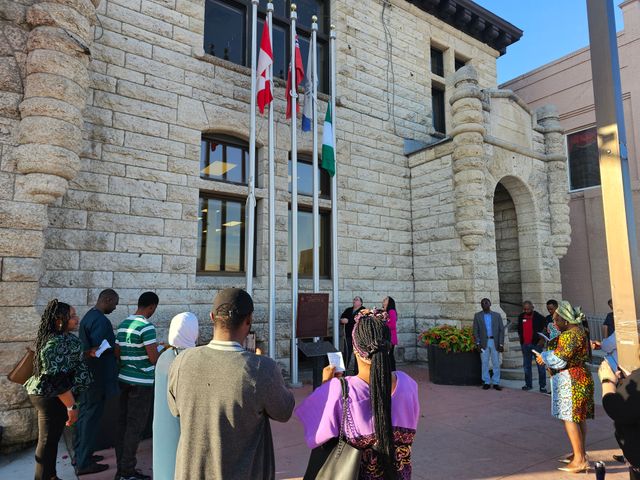Local News
Green and white flag soars in Portage for Nigerian Independence Day
Portage la Prairie marked Nigerian Independence Day earlier today with a 9 a.m. flag-raising at City Hall, facilitated by the City in partnership with the Association of Nigerians in Portage la Prairie. The green-and-white flag rose alongside the Maple Leaf as attendees sang both the Canadian and Nigerian national anthems and heard remarks about freedom, unity, and heritage. Songs, colours, community Mayor Sharilyn Knox welcomed the crowd and stressed that the gathering was about people as much as pageantry. Knox says: “So, events like this today are more than about raising the flag. It's really about celebrating the people, the culture, and the contributions of the Nigerian community right here in Portage La Prairie, which I know is growing at a fast rate sometimes, so that's awesome.” Knox underlined how diversity strengthened the city, adding, “Events like this remind us that our city is stronger when we have diversity, when we can learn from one another, and we can honour the stories that shape who we are. So I want to say happy Independence Day to our Nigerian friends and neighbours. We are incredibly glad that you are a part of our community. Thank you.” Deputy Mayor Joe Masi helped raise the flag and highlighted both celebration and responsibility. “I think it's a great feeling for our city to see the diversity in the Nigerian community coming forward and celebrating," he says, noting the importance of independence not only for Nigeria but for other nations as well. "Independence, freedom, it's important, but you have to keep working at it to make sure it's always there for the country," Masi continues, "We in Portage are just thrilled to have this community come forward, enjoy the day, and celebrate it with us who are not from Nigeria, but as a city, we want to celebrate with them." Voices from city hall Association member Inemesit Adeniyi placed the ceremony in historical context, referencing the Scramble for Africa, the 1884 Berlin Conference, and British colonial rule in what became Nigeria. “We are gathered here today to celebrate the anniversary of Nigeria's independence from colonial rule," Adeniyi began, before recounting what life was like before colonization. "A long time ago, in a land very far away, there lived fragmented, self-organizing, self-governing, autonomous communities, albeit traditional.” Adeniyi described how European powers formalized colonization, saying, “A conference was held at Berlin in 1884 to formalize the rules of colonization. So the European countries brought religion, textiles, mirrors, and all sorts of other things on one hand and colonization on the other. They sought to control the abundant natural resources, factors of production, and the African people.” Adeniyi then traced the road to self-rule and noted in her speech that, “After many meetings, dialogues, conferences, agreements, and consensus, on the 1st of October 1960, the Union Jack was lowered, and the new Nigerian flag was hoisted. Nigeria attained independence.” Association member Monsur Jolaoso also reflected on the emotion of Oct. 1, 1960, and the work that followed. He too addressed the lowering of the Union Jack, adding, "In a single moment, Nigeria took her rightful place among the community of free nations. It was a day filled with hope, pride and unity.” Jolaoso emphasized that independence began an ongoing journey of nation-building. He notes that,“Independence was not just a change of flag. It was the beginning of a new journey. It was a call to unity, a call to responsibility, a call to every Nigerian to build a nation strong and great.” Figures who shaped the journey Adeniyi's address pointed to independence leaders whose names remained central to the movement and its legacy. Nnamdi Azikiwe (“Zik”) was a leading nationalist voice and later served as Nigeria’s first President, helping to articulate a pan-Nigerian identity during decolonization. Obafemi Awolowo championed federalism and social development as Premier of the Western Region, advancing free primary education and regional self-government. Ahmadu Bello, the Sardauna of Sokoto, led the Northern People’s Congress and served as Premier of the Northern Region, shaping consensus politics in the run-up to independence. Sir Abubakar Tafawa Balewa became the country’s first Prime Minister and delivered the independence address that signalled Nigeria’s entry onto the world stage. Funmilayo Ransome-Kuti organized the Abeokuta Women’s Union and pushed for women’s suffrage and civic rights, broadening the independence struggle beyond elite politics. The ceremony’s speakers connected those figures’ contributions to the values celebrated in Portage la Prairie—unity, perseverance, and civic participation. As the flags came down and the crowd dispersed, organizers and attendees left with a shared reminder: the joy of 1960 inspired celebration today, and the responsibility of freedom continued tomorrow through neighbourliness, community service, and pride in heritage. Sign up to get the latest local news headlines delivered directly to your inbox every afternoon. Send your news tips, story ideas, pictures, and videos to news@portageonline.com. PortageOnline encourages you to get your news directly from your trusted source by bookmarking this page and downloading the PortageOnline app.
